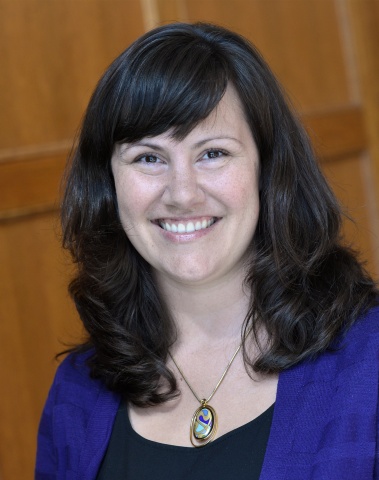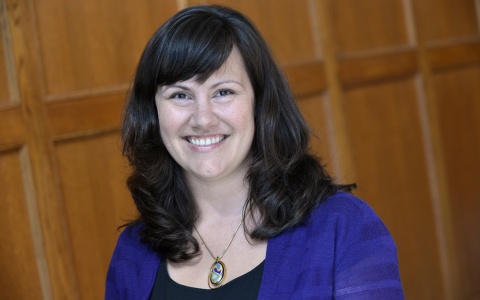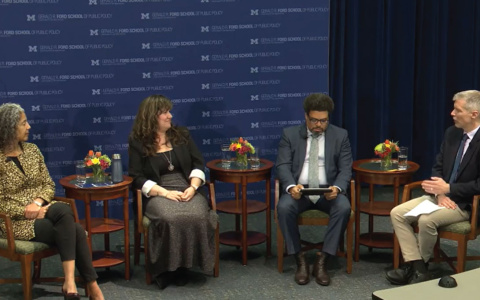Natasha Pilkauskas
Natasha Pilkauskas is an associate professor of public policy at the University of Michigan's Gerald R. Ford School of Public Policy. Her research considers how demographic, social safety net, and economic shifts in the U.S. affect families and children with low-incomes. One strand of her research focuses on the living arrangements of children‚ especially those who live multigenerational households. A second aspect of her work considers economic insecurity, poverty and family wellbeing. A third area focuses on how cash transfer policies, like the Earned Income Tax Credit, might improve the developmental and life trajectories of children living in poverty. Pilkauskas' current research projects include several studies of both the Earned Income Tax Credit and the 2021 Child Tax Credit.
Pilkauskas' research has been published in broad array of top peer-reviewed journals across academic fields including demography, sociology, social work, public health, developmental psychology, and economics. Her research has also been supported by the Russell Sage Foundation, the Institute for Research on Poverty, and the National Academy of Education/Spencer Foundation, among others.
Pilkauskas received her BA in sociology and economics from Northwestern University, her Master of Public Policy from Harvard's Kennedy School of Government, and her MA and PhD in social welfare policy from Columbia University. Before getting her PhD she worked as a political pollster and as a policy analyst at a research think tank.
Learn more on Pilkauskas' personal website.
Educational background
- MA and PhD in social welfare policy, Columbia University
- MPP, Harvard University
- BA in sociology and economics, Northwestern University
Recent publications
- McInnis, N., Michelmore, K. & Pilkauskas, N.V. (Forthcoming). The intergenerational transmission of public assistance – evidence from the Earned Income Tax Credit. NBER Working Paper 31429. Journal of Human Resources. Available online https://doi.org/10.3368/jhr.0422-12241R2
- Pilkauskas, N.V., Michelmore, K., Kovski, N. & Shaefer, H.L. (2024). The expanded Child Tax Credit and low-income families’ economic wellbeing. Journal of Population Economics, 37, 68. https://rdcu.be/dVDTx
- Pilkauskas, N.V., Michelmore, K. & Kovski, N. (2024). The 2021 Child Tax Credit, housing affordability, and the living arrangements of families with low incomes. Demography, 61, 1069–1096. https://read.dukeupress.edu/demography/article/61/4/1069/389197/The-Effects-of-the-2021-Child-Tax-Credit-on
- Amorim, M. & Pilkauskas, N.V. (2023) “Excess” doubling up during COVID – changes in children’s shared living arrangements. Demography, 60, 1283-1307. https://read.dukeupress.edu/demography/article/60/5/1283/381853/Excess-Doubling-Up-During-COVID-Changes-in
- Pilkauskas, N.V., Jacob, B.A., Rhodes, E., Richard, K. & Shaefer, H. L. (2023). The COVID cash transfer study: the impacts of a one-time unconditional cash transfer on the wellbeing of families receiving SNAP in twelve states. Journal of Policy Analysis and Management, 42, 3, 771-795.
- Michelmore, K. & Pilkauskas, N.V. (2021). Tots and teens: How does child's age influence maternal labor supply and child care response to the Earned Income Tax Credit? Journal of Labor Economics, 39, 895-929. https://www.journals.uchicago.edu/doi/10.1086/711383
- Pilkauskas, N.V., Amorim, M. & Dunifon, R. (2020). Historical trends in children living in multigenerational households in the United States: 1870-2018. Demography, 57, 2269-2296. https://rdcu.be/b7ZcL
- Pilkauskas, N.V., Jacob, B.A., Rhodes, E., Richard, K. & Shaefer, H. L. (2023). The COVID cash transfer study: the impacts of a one-time unconditional cash transfer on the wellbeing of families receiving SNAP in twelve states. Journal of Policy Analysis and Management, 42, 3, 771-795.
- Michelmore, K. & Pilkauskas, N.V. (2023). The 2021 Child Tax Credit: Who received it and how did they spend it? AEA Papers and Proceedings, 113, 413-419.
- Kovski, N., Pilkauskas, N.V, Michelmore, K. & Shaefer, H.L. (2023). Unconditional cash transfers and mental health symptoms among parents with low incomes: Evidence from the 2021 Child Tax Credit. Social Science and Medicine – Population Health, 22, 101420. https://www.sciencedirect.com/science/article/pii/S235282732300085X
- Jacob, B., Pilkauskas, N.V., Rhodes, E., Richard, K. & Shaefer, H. L. (Forthcoming). The COVID cash transfer study: the hardship and mental health impacts of an unconditional cash transfer to low-income individuals. The National Tax Journal's Forum on Basic Income. https://sites.fordschool.umich.edu/poverty2021/files/2022/06/Jacob_et_a…
- Michelmore, K. & Pilkauskas, N.V. (2022). The Earned Income Tax Credit, family complexity and children's living arrangements. RSF: The Russell Sage Foundation Journal of the Social Sciences, 5, 143-165. https://www.rsfjournal.org/content/rsfjss/8/5/143.full.pdf
- Michelmore, K. & Pilkauskas, N.V. (2021). Tots and teens: How does child's age influence maternal labor supply and child care response to the Earned Income Tax Credit? Journal of Labor Economics, 39, 895-929. https://www.journals.uchicago.edu/doi/10.1086/711383
- Pilkauskas, N.V., Amorim, M. & Dunifon, R. (2020). Historical trends in children living in multigenerational households in the United States: 1870-2018. Demography, 57, 2269-2296. https://rdcu.be/bG8VB
- Amorim, M. & Pilkauskas, N.V. (Forthcoming) “Excess” doubling up during COVID – changes in children’s shared living arrangements. Demography
See Pilkauskas' personal website for more publications.









